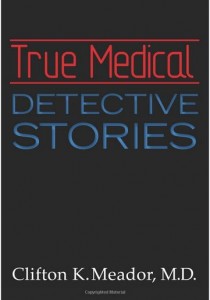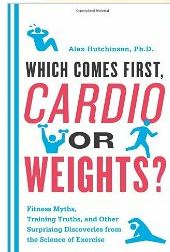
September 5th, 2012 by Dr. Val Jones in Book Reviews
Tags: Clifton K. Meador, Clifton Meador, Detective Stories, Internal Medicine, M.D., Medicine, True Medical Detective Stories, UAB, Vanderbilt
2 Comments »
 I just finished reading True Medical Detective Stories, Dr. Clifton Meador’s personal collection of medical mysteries. Dr. Meador is a prolific writer and the former dean of the University of Alabama School of Medicine and professor at Vanderbilt School of Medicine. His 50+ years in the academic arena have exposed him to some delightfully rare and bizarre medical cases, and he shares his top 18 in this pithy little book.
I just finished reading True Medical Detective Stories, Dr. Clifton Meador’s personal collection of medical mysteries. Dr. Meador is a prolific writer and the former dean of the University of Alabama School of Medicine and professor at Vanderbilt School of Medicine. His 50+ years in the academic arena have exposed him to some delightfully rare and bizarre medical cases, and he shares his top 18 in this pithy little book.
Dr. Meador was inspired by Berton Roueché, a staff writer at The New Yorker, who helped to popularize the medical detective story genre in the 1940’s and beyond. Each vignette is between 3-5 pages in length, making for a very quick and entertaining read. In choosing to review this book I was very tempted to give away details of some of the cases in order to entice you to read it, but I have resisted the urge so as not to spoil the fun.
Broadly speaking, the stories include a rare case of intractable hiccups, a bizarre infection caused by sexually deviant behavior, and several examples of the power of the mind to inflict bodily harm on oneself and others. In each situation, the underlying cause of the symptoms or disease is uncovered through careful listening and analysis. Often, human shame and fear must be managed before the truth can bubble to the surface.
I highly recommend this book to healthcare professionals, skeptics, and anyone interested in a fascinating look at some of the most unusual medical cases described in one book. Perhaps we can all learn to become better listeners, or true “medical detectives,” from Dr. Meador’s stories. You can find his book here at Amazon.com. Enjoy!
July 9th, 2012 by Dr. Val Jones in Book Reviews, Health Tips
Tags: Alex Hutchinson, Book Review, Breathing, Caffeine, Cardio Or Weights, Exercise, Fitness, Myth-Busters, Mythbusters, Myths, Olympics, Running, Stretching, Tips, Which Comes First
1 Comment »
 I just finished reading a great little book called, “Which Comes First, Cardio Or Weights? Fitness Myths, Training Truths, And Other Surprising Discoveries From The Science Of Exercise” by Alex Hutchinson, Ph.D. I’m very grateful to Alex for patiently sifting through over 400 research studies in a quest to answer (with evidence, not subjective opinion) some of our most nagging exercise questions.
I just finished reading a great little book called, “Which Comes First, Cardio Or Weights? Fitness Myths, Training Truths, And Other Surprising Discoveries From The Science Of Exercise” by Alex Hutchinson, Ph.D. I’m very grateful to Alex for patiently sifting through over 400 research studies in a quest to answer (with evidence, not subjective opinion) some of our most nagging exercise questions.
Alex is the perfect guy to do this exercise myth-busting as he is a competitive runner, professional journalist, and has a Ph.D. in physics. His writing is crisp, uncluttered, and bears the understated humor of a Canadian. To be honest, I enjoyed his book so much that I was contemplating blogging about most of his conclusions. However, I don’t want to teeter on the edge of copyright infringement, so I’ll just provide you with some highlights from my favorite sections of the book:
1. Do compression garments help you exercise? I’ve wondered this many times as I jiggled my way down the road on a long run. I’ve always liked the theory behind tight outer-garments, that they reduce unnecessary movement during running, thus making one’s movement more efficient and reducing the bounce and drag on muscles and skin. They may also help with blood return to the heart and reduction in peripheral edema, speeding recovery from exercise. Believing the plausibility of the argument, I have indeed sprung for some rather expensive running tights.
So what does the scientific literature have to say about compression garments’ role in exercise? Apparently there is nothing conclusive yet. Small studies have shown no clear improvement in exercise economy, athletic power or endurance, or recovery from exercise. The only measurable benefits appear to have occurred in those who believed that the compression garments would help their performance. A nice reminder of the importance of the “mind-body” connection in athletic pursuits. Bottom line: if you like how you feel in compression garments, by all means wear them. But don’t expect any dramatic improvements in anything more than your jiggle factor.
2. Will sitting too long at work counteract all my fitness gains? The short answer to this question is: possibly. I was surprised to note that at least one large study found that sitting for more than six hours per day increased one’s risk of death by 18-37% regardless of how much exercise one performed in the other eighteen hours of the day. Long periods of sitting appear to be quite bad for your health, so getting up and moving around every hour or more is important if you have a sedentary job or lifestyle.
3. Does listening to music or watching TV help or hurt my workout? Listening to faster-tempo music can result in increased exercise effort (in many cases completely unconsciously), while TV-watching usually results in a reduced exercise effort. This is because watching videos requires visual attention and subtle changes in balance and movement occur to accomplish it.
4. Will stretching help me avoid injuries? As a person with limited flexibility, I found this section of the book to be quite comforting. As I have blogged previously, stretching has not been shown to reduce the risk of injury or post-exercise soreness. In fact, it can decrease power and speed for certain athletes, though it is important for those who intend to perform great feats of flexibility (such as gymnastics).
5. Should I take pain killers for post-workout soreness? Interestingly, non-steroidal anti-inflammatory drugs (NSAIDs) are not particularly effective in reducing post-exercise pain and can even interfere with muscle repair. NSAIDs block prostaglandins, which are important in collagen synthesis. While NSAIDs are useful in reducing inflammation and swelling in acute injuries (such as an ankle sprain), general muscle soreness isn’t a good reason to pop some ibuprofen.
6. Will drinking coffee help or hinder my performance? I’m one of the few people I know who doesn’t drink coffee, so I was surprised to discover that I may have been missing out on an important exercise enhancer. According to decades of research, caffeine is likely to improve your exercise performance. Studies have shown that pure caffeine (not necessarily in its coffee form) enhances sprint performance as well as endurance activities up to two hours. In 2004 the World Anti-Doping Agency removed caffeine from its list of restricted substances, so expect to see some caffeinated athletes in this summer’s Olympics.
7. What’s the best way to breathe during exercise? If you’ve ever marveled at your own panting, you’ve also probably wondered if there is a more efficient way to breathe – or at least a less embarrassing way. The answer is no. Studies have shown that people who consciously work to make their breathing less labored expend more energy and get less oxygen in the process. So, keep on breathing the way your body wants to… you’re naturally more efficient at it than you think.
I hope that these little tidbits have whet your appetite for more of Alex’s excellent insights. I have fully equipped myself with fast-paced music and a little caffeine, as I move my inflexible, jiggly, panting self down the road on another long run.
June 14th, 2012 by Dr. Val Jones in Book Reviews
Tags: Couples Counseling, Couples Therapy, I Love You But I Don't Trust You, Mira Kirshenbaum, Psychiatry, Psychology, Relationships, Self-Help, Trust
No Comments »

Author Mira Kirshenbaum
I Love You But I Don’t Trust You is national bestselling author, Mira Kirshenbaum’s, 11th book about healing relationships. I had the privilege of working with Mira when she was part of my medical expert team at Revolution Health, so I welcomed the chance to review her latest work. Although I had to endure some curious looks from my fiancé (who wondered why I was reading a book with that title), Mira’s writing sparked some interesting discussions between us and reinforced our own trust in each other.
When I first read the title of the book, I assumed that it would be focused on what to do when your partner has an affair. I was surprised to discover that I was utterly wrong. In fact, relational trust deficits can be caused by anything from broken promises, to misrepresenting financial situations, to lording one’s power over another. I Love You But I Don’t Trust You opened my eyes to all the subtle ways that trust can be eroded, and at the same time offered “actionable” advice for shoring up relationships.
Mira’s writing is particularly engaging because she illustrates her ideas with poignant, real-life examples. For every breach of trust under discussion, she offers a case study. Sometimes the couples she describes make outrageous gaffs, and the emotional train wreck that ensues is both terrifying and riveting. Example after example of poor judgment, bad behavior, and selfish acts could potentially be depressing, if it weren’t for the good news that follows. Many of these couples were able to resolve their conflicts and restore trust against all odds. Illustrating how that happens is part of the reason why Mira’s book is a page-turner.
Beyond advice for couples, I Love You But I Don’t Trust You is actually quite relevant for anyone who has been deeply wronged. Mira describes how she herself was able to offer true forgiveness to a former Nazi soldier who had participated (indirectly) in putting her own parents in a concentration camp. She describes a life-changing moment when she was traveling in Europe as a young woman, and she became very ill and fainted at the train station. A German couple took her to their home and nursed her back to health. Mira learned to trust the “untrustable” and became convinced through this experience that no relationship was beyond help. She devoted the rest of her life to relationship counseling, and her passion fosters hope in each of her books.
Some things you will learn from I Love You But I Don’t Trust You:
*All the ways that mistrust can enter a relationship
*Is your relationship worth saving?
*The typical response to broken trust, and the way to minimize collateral damage
*Suggested timeline for change and trust repair
*How to restore trust by working through 6 key questions
The only downside to Mira’s book is that it is based upon, as far as I can tell, the informed experience of only one therapist. Mira does not refer to the academic literature to support her theses or suggestions, nor does she appear to rely upon outside sources for additional insight. Mira speaks from her gut – she has a brilliant way of positioning arguments, and helping people to approach each other in ways that are minimally inflammatory in what is otherwise an emotional mine field. Beyond that, I can’t say if Mira’s approach to conflict resolution is optimal. My instinct says it’s as fine a methodology as any I’ve seen, but from an evidence-based perspective, there isn’t necessarily a lot of data behind it (just had to add that caveat for my science-loving friends).
Nonetheless, in my opinion, I Love You But I Don’t Trust You would be an excellent workbook for people in couples’ therapy. In fact, the Appendix lists suggested topics and questions for discussion groups, so I’m sure that Mira was thinking the same thing when she wrote it.
But most importantly, I think that reading the book in advance of any trust violations in your relationship, could be the best course of action. Simply learning about all the damage that one impulsive decision can cause to a lover and/or family could make you less likely to make that decision! I Love You But I Don’t Trust You might best be used as a preventive health measure for your relationship(s). I’m sure it has strengthened me against trust violations in my future.
**You can order the book on Amazon.com here **
December 23rd, 2011 by Jessie Gruman, Ph.D. in Book Reviews, Health Policy
Tags: ACA, Book, CFAH, Dissecting American Health Care: Commentaries on Health Policy and Politics, Doug Kamerow, Essays, health care, Health Care Reform, Health Policy, Jessie Gruman, National Public Radio, NPR, Public Health
No Comments »

 My friend and former Chair of the CFAH Board of Trustees, Doug Kamerow, has written a book that I think you will like.
My friend and former Chair of the CFAH Board of Trustees, Doug Kamerow, has written a book that I think you will like.
Besides being a mensch and witty as heck, Doug is a family doctor and a preventive medicine specialist. In his new book, Dissecting American Health Care: Commentaries on Health Policy and Politics, these four characteristics constitute the lens through which he comments on scores of events, controversies and changes in public health and health policy that have taken place over the past four years. For example, Doug writes about last year’s debate over the H1N1 vaccine, the papal position on condoms and HIV, how prevention fared in the health care reform act (ACA) and his attempt to Read more »
*This blog post was originally published at Prepared Patient Forum: What It Takes Blog*
October 1st, 2011 by KennyLinMD in Book Reviews, Opinion
Tags: Book, Cancer Screening, Decisions, Harvard, Health Policy Program, Health-related choices, How Doctors Think, Jerome Groopman, New America Foundation, New Yorker, Oncology, Pamela Hartzband, PSA, Shannon Brownlee, Shared Decision-Making, Your Medical Mind
No Comments »

 Recently, I had a conversation with Shannon Brownlee (the widely respected science journalist and acting director of the Health Policy Program at the New America Foundation) about whether men should continue to have access to the PSA test for prostate cancer screening, despite the overwhelming evidence that it extends few, if any, lives and harms many more men than it benefits. She felt that if patients could be provided with truly unbiased information and appropriate decision aids, they should still be able to choose to have the test (and have it covered by medical insurance). Believing that one of the most important roles of doctors is to prevent patients from making bad decisions, I disagreed.
Recently, I had a conversation with Shannon Brownlee (the widely respected science journalist and acting director of the Health Policy Program at the New America Foundation) about whether men should continue to have access to the PSA test for prostate cancer screening, despite the overwhelming evidence that it extends few, if any, lives and harms many more men than it benefits. She felt that if patients could be provided with truly unbiased information and appropriate decision aids, they should still be able to choose to have the test (and have it covered by medical insurance). Believing that one of the most important roles of doctors is to prevent patients from making bad decisions, I disagreed.
After reading Your Medical Mind, the new book by Harvard oncologist and New Yorker columnist Jerome Groopman, I think he would probably side with Brownlee’s point of view. Groopman, whose authoring credits include the 2007 bestseller How Doctors Think, and wife Pamela Hartzband, MD have written a kind of sequel to that book that could have easily been titled How Patients Think. Drawing on interviews with dozens of patients about a wide variety of medical decisions – from starting a cholesterol-lowering drug, to having knee surgery, to accepting or refusing heroic end-of-life interventions – the authors Read more »
*This blog post was originally published at Common Sense Family Doctor*
 I just finished reading True Medical Detective Stories, Dr. Clifton Meador’s personal collection of medical mysteries. Dr. Meador is a prolific writer and the former dean of the University of Alabama School of Medicine and professor at Vanderbilt School of Medicine. His 50+ years in the academic arena have exposed him to some delightfully rare and bizarre medical cases, and he shares his top 18 in this pithy little book.
I just finished reading True Medical Detective Stories, Dr. Clifton Meador’s personal collection of medical mysteries. Dr. Meador is a prolific writer and the former dean of the University of Alabama School of Medicine and professor at Vanderbilt School of Medicine. His 50+ years in the academic arena have exposed him to some delightfully rare and bizarre medical cases, and he shares his top 18 in this pithy little book.


 I just finished reading a great little book called, “
I just finished reading a great little book called, “

 My friend and former Chair of the CFAH Board of Trustees, Doug Kamerow, has written a book that I think you will like.
My friend and former Chair of the CFAH Board of Trustees, Doug Kamerow, has written a book that I think you will like.









